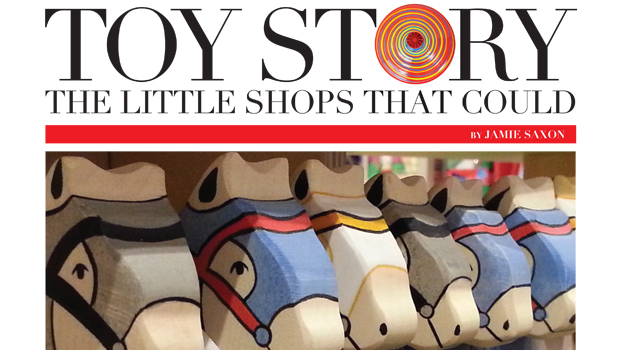Toy Story: The Little Shops That Could

By Jamie Saxon
The first time my parents took my sister and me—dressed in our best Sunday dresses, white tights, black patent leather Mary Janes and “good” winter coats—to F.A.O. Schwarz on Fifth Avenue, the store loomed above us like a fairy tale castle, where we were greeted by real-life toy soldiers in bright red uniforms and black fur hats.
My parents said, "You may pick one toy." We let go of their hands and ran around like pinballs, hopping on the foot piano (made famous many years later by Tom Hanks in "Big"), hugging giant teddy bears, and peering into the cellophane windows of boxes with exquisitely dressed Madame Alexander dolls. Finally we came back, breathless and starry-eyed, each of us clutching one toy—my sister a nurse's kit, me a set of pastels with 64 colors. And then, my father very quietly said, "You know, girls, there are two more floors. This is only the first floor." Our mouths formed astonished little "O's."
Since 1862, F.A.O. Schwarz continues to enchant New Yorkers and tourists alike. Today you can decorate your own cupcakes on the second floor, get a glitter tattoo by an in-house artist or have a private tour and breakfast with a toy soldier before the store opens—dozens of independent toy stores all over the city are also capturing hearts and the inner child in everyone. And if you need it, they are the perfect escape from this holiday season's hottest toy, the Rainbow Loom, which makes rubber band friendship bracelets. Ask any grade schooler you know about little Ashley Steph's Rainbow Loom YouTube video tutorials: one of her latest, How to Make a Starburst Bracelet, which she cranked out right before her family's Florida vacation, has surpassed three million views. Some independent toy stores, including Boomerang Toys and Mary Arnold Toys, carry Rainbow Loom.
At Kidding Around in Chelsea (60 W. 15th St.), you might feel as if you've stepped into an old-fashioned nursery, with hardwood floors, oriental rugs and tall antique glass-paned wooden cabinets with shelves filled to the brim with stuffed mice tucked into painted wooden beds and a Princess and the Pea doll perched upon a bed piled high with tiny calico mattresses.
"What keeps this store special is that it's still a mom and pop shop," says manager Alexis Smith about husband-and-wife owners Christina Clark and Paul Nippes. "Their motto is 'classic with a twist.'"
She likes MasterKitz, which lets you paint your own version of Claude Monet's "Water Lilies" or Van Gogh's "Starry Night" and secretly doubles as an art history lesson. For infants, she suggests Djeco's Topanimo set of six stack and nest blocks, with shapes pictured on the top and numbers on the side. Each block is a little "house" for a color-coordinated plastic animal you can also take in the tub. "Little ones can stack the blocks, but as they get older, they can play house," Smith says.
For little hands she recommends Plan Toys' Gears and Puzzles, which encourage creative play and problem solving. The company, known for its wooden toys, wanted to repurpose the sawdust it generated. It developed a way to recycle the sawdust, packing it into a solid material as smooth as plastic, painting it with organic natural dyes and fashioning it into giant puzzle pieces that each have a notch in the center for a gear.
The store's "classic with a twist" philosophy also plays out in games like Dr. Seuss' Super Stretchy ABC. A modern take on the old Twister floor game, players are directed to place their hands and feet on letters of the alphabet, each with a corresponding illustration of an object that begins with that letter.
Dinosaur Hill in the East Village (306 E. 9th St.) really belongs on a country lane. Its weather worn, hand-painted wooden sign reads "Handmade Wonderments."
Inside, as chamber music plays quietly, I find owner Pam Pier in her lovingly messy loft office that overlooks the store, her Lhassa Tibetan spaniel, Pip, at her feet. A former freelance artist (she made the giant dryad-faced papier mache tree in the window) and preschool teacher, Pier says the store, which just celebrated its 30th birthday, combines her three passions: art, kids and education.
"Play is the work of early childhood," Pier says. "I want kids to become effortlessly involved on an intellectual and aesthetic plane and to learn general concepts while working with toys. I also select toys that have enough interesting aspects that adults will not hesitate to jump in and play with children."
Some of the most well-loved toys in the store, as well as toys she's excited about for the upcoming holiday season, include alphabet blocks in 17 languages; hand and finger puppets made by a woman from the neighborhood; animal marionettes made in the Czech Republic; sophisticated kits about physics, circuitry and solar energy; classic children's books; and hand-knit sweaters.
At Boomerang in Tribeca (119 West Broadway), I fall for the Jellycat stuffed animals from London—sleep-tight soft and small enough to carry to a restaurant to keep you occupied while the grownups talk, with names like Bashful Toffee Puppy and New Woodland Baby Fox.
Best sellers include Munipals, toy subway trains made of solid wood, developed with the New York City Transit Museum and compatible with all standard wooden railway systems; Micro Scooters by Kickboard USA, and Valtech's Magna-tiles, which are popular in area preschools so parents want them too.
"Depending on the child's age, the kind of play they are doing is really teaching them," says owner Karen Berwick. "To that end we carefully pick each and every toy we carry so that it offers the most play value, while offering a learning experience."
For the coming holiday season, Berwick is excited about Haba's teepee play tent and wooden Moover Doll Pram, Mirare's Pop! Pop! Piano and Quercetti's Marble Runs.
A few blocks away is Playing Mantis (32 North Moore St.), its bright red storefront so distinctive that Travel & Leisure magazine shot its cover model in front of the store for its September issue.
In this wonderland of wooden toys made by artisans around the world—dollhouses, castles, fairy tale cottages, Noah's arks, chess sets and pirate ships—I find salesperson Joe Pulido wrapping a giant box in the store's signature ivy-stamped brown recycled paper and burlap "ribbon." A neighborhood boy peeks his head in the store. Pulido greets the boy by name. "Mom says, no go in dere," the boy stage whispers with a lisp. "OK, see you tomorrow," Pulido calls out. "Say hello to mom and dad!"
He tells me the boy lives upstairs, and all the neighborhood kids come in to play. He points out some of the most popular items, including a painted wood stacking "sandwich" with a lettuce layer, tomato, meat, Swiss cheese and pickles; stuffed animals made from recycled sweaters; and colorful felt zippered toy bags to cart your toys to your friend's house.
"The store exists to inspire children, to show them what our hands can do in collaboration with nature," says owner Imelda McCain.
Little Things Toy Store in Park Slope is designed for kids to play in, says owner Mitch Szpicek, starting with a Brio wooden train set up on a low table on the sidewalk out front.
"We cherry pick the best items and try not to be so 'special' that kids won't want to have fun in the store," says Szpicek, who wanders around with me, all the while holding onto a big bunch of balloons for a customer until she's through shopping. "You'll see kids filling up the doll strollers with dolls and the toy shopping carts with toys. This is a space to play, not just to buy a toy." Kids flock to the multi-shelf display of plastic animals, plopping themselves down on the floor, each happily assembling their own menagerie or jungle herd.
Just a block down from Little Things is Norman & Jules (158 Seventh Ave., which made it into New York magazine's Best of New York issue in March. With its visually peaceful palette of grey carpet, an exposed brick wall and plenty of low shelves placed at the eye level of your average four-year-old, Norman & Jules will appeal to anyone who's had it with the glitz and commercialism, noise and garishness of the big box stores.
The store was founded a year ago by former corporate crunchers turned entrepreneurs Avi Kravitz and Courtney Ebner—who live with their three-year-old daughter just a couple of blocks away. "We strongly believe in open-ended play—toys that don't come with instructions," says Kravitz. "This allows children to use their imaginations."
A block set in the shape of bands of the rainbow can be taken apart and turned upside down to make bridges, arches or a mountain range and then more complicated structures as the child grows. "Children do not need all the bells and whistles to learn," says Kravitz.
They choose products made from materials that are environmentally sustainable, crafted by artisans who are paid fairly, as well as toys by Kickstarter-funded companies like Kinetic Creators and Toobalink.
In the back of the store I find a little boy who captures the essence of what a good toy does. Engaged in conversation with a simple felt shark puppet on one arm, he rebuffs his mother's efforts to leave the store. "I just want to be like making it up with this," he says.

